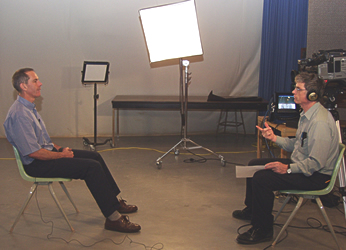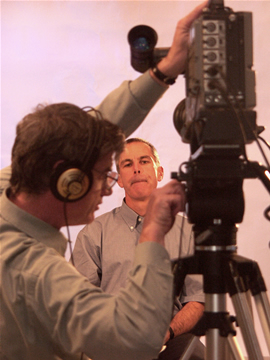When Harry Met Larry
On Oct 30 and Nov 01 of this year, curriculum-development expert Dr. Harry Hubball (UBC) visited the University of Windsor to discuss progress made by the university in making this a more "learning-centered" institution. During his first visit in 2003, he discussed program development with the Academic Management Group, led course-design work shops, and met with individual faculty. He also shared some thoughts on curriculum-design with CFL media production manager Larry Foley, which we reprint here in anticipation of Dr. Hubball's forthcoming visit:

...when Larry interviewed Harry...
Larry: You use the term “curriculum re-design.” How do you define that?
Harry: I define curriculum re-design as a re-examination of outcomes, objectives, assessment strategies and procedures, and pedagogies that are inherent in a particular program. In the past, curriculum has often been driven by content and by adding courses, not necessarily by coherence in the whole program. It certainly was not driven by learning objectives in terms of what the students are expected to be able to know or to do. When you examine it from the students’ perspective of moving through this program horizontally (year one), but also vertically (as they go through year one, year two, year three, year four), curriculum doesn’t always make a lot of sense. So curriculum re-design is putting a learning-centred focus to the process, and identifying the outcomes that students are expected to be able to know and do upon completion of the program (those outcomes developed by input from students, faculty, as well as the broader community). Along with that come assessment strategies. What assessment strategies are in place to be able to assess those outcomes in a meaningful way? And then, what are the pedagogies (the teaching and learning methods) that are able to support the assessment strategies? That’s how I would define “curriculum re-design” as opposed to “curriculum development” which is a less radical re-examination [and which] assumes that there is a learning-centred focus already. Curriculum re-design is more of a shift from a traditional notion to a learning-centred focus.
...curriculum re-design is putting a learning-centred focus to the process, and identifying the outcomes that students are expected to be able to know and do upon completion of the program
Larry: What do you mean by “learning-centred?”
Harry: The learning-centred approach takes into account the needs of students. It takes into account the needs of faculty. It takes into account the needs of curriculum and maybe even the needs of the professional body, but it also considers available resources.
Larry: What can faculty do to make a difference in their teaching?
Harry: … Make a beeline to those faculty who are considered excellent teachers in the department or faculty. Look at their course syllabi; try to find 10 minutes to speak to them about how they go about course design…. Also, involve the students [before and during] the course in getting input to make that course … targeted and tailored to the needs and circumstances of not only the students (which is really important), but also to the curricula and how that course is situated into a bigger program context.

...when Larry shot Harry...
Larry: University culture teaches faculty about the scholarship of research. However, many faculty are surprised and overwhelmed by the notion that scholarship should also be an element in teaching. What incentives could be put in place to motivate faculty to become more interested in participating in the scholarship of teaching?
If curriculum change is important for the university, if a commitment to teaching and student learning is important to the university, then the mechanisms need to be in place to reflect those values….
Harry: …a lot of the debate and origins of this notion come from Ernest Boyer’s Scholarship Revisited. Boyer urged universities to consider a much broader notion of scholarship which included teaching. To answer your question, though, the tenure and promotion process has really got to reflect those goals. If curriculum change is important for the university, if a commitment to teaching and student learning is important to the university, then the mechanisms need to be in place to reflect those values….Part of that would be not only demonstrating your scholarship in terms of research, but also demonstrating your scholarship in terms of teaching through peer review, through conference presentations, through innovative course design, or through publications and action research on your own teaching practice. The flip side of that is when there is no mention of the scholarship, of teaching at the senior appointments committee, when there’s no criteria for how faculty can demonstrate the scholarship of teaching, it’s almost like saying, “You know what, we want all this work, we want all this time out of you in terms of curriculum change, course design, but guess what — it’s going to be other criteria that gets you through the tenure.” There’s obviously a disconnect there…. And also, the institution could embark on a program that fosters the scholarship of teaching. That’s sending a very powerful signal that teaching is of value in the institution and will help serve to realize the goals of the institution. [The program should be] sufficiently responsive for faculty to be able to develop knowledge, abilities, and skills to go back to departments and make further contributions, as well as enable them as individuals to grow….
...also, the institution could embark on a program that fosters the scholarship of teaching. That’s sending a very powerful signal that teaching is of value in the institution...
Larry: Do you have any thing additional to say to University of Windsor personnel interested in curriculum re-design?
Harry: I’d ask a series of questions. …To what extent is there a coherent learning community in your faculty? Who is your learning community? How does your learning community want to operate in the best possible way? Are the key stakeholders involved in that process of development? What outcomes do you think are important for all graduates from the University of Windsor? Are they outcomes that you can put in your course design? Are they outcomes that your faculty (as a whole) could work towards? I would also say, to what extent is curriculum reform important to you? And what would you like to see? How is that being contributed at the faculty level, as well as within your own course design? …I wish you all good luck. It’s a really fabulous and fascinating environment right now…. We’re starting to see the interest and the openness people have to recognize some of the great things that are already going on [and] also an openness to further develop a curriculum. That’s pretty exciting for everybody.
Harry Hubball is a curriculum-development expert, and the Certificate Program Coordinator at UBC’s Centre for Teaching and Academic Growth.
Larry Foley is a video producer, and the Manager of Media Production at the Centre for Flexible Learning, University of Windsor.
This interview originally appeared in Explorer Vol 3 No. 1 Spring 2003


 Print
Print